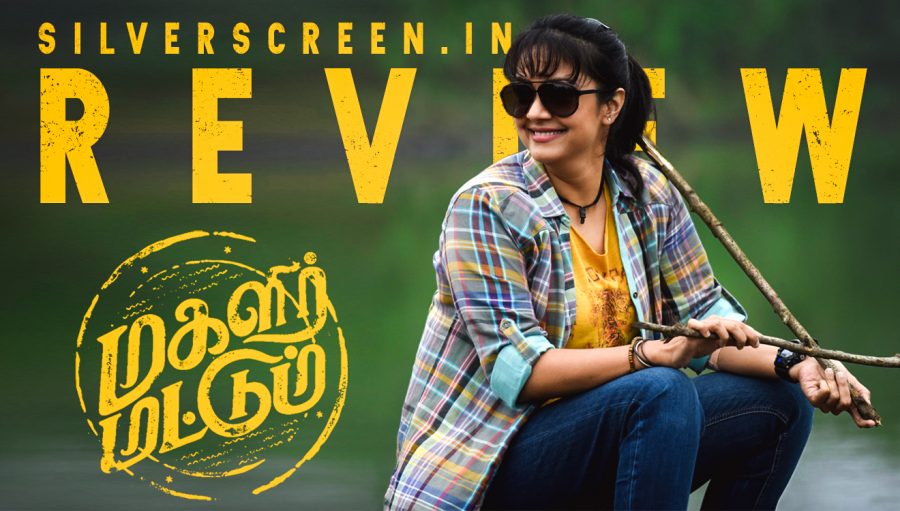At the heart of Magalir Mattum is a beautiful relationship; a little too perfect in theory, but that perhaps is the whole point. Bramma weaves an unorthodox tale of a mother-in-law and a daughter-in-law, brilliantly side-stepping their common connection: The son/the husband. There just absolutely isn’t any trace of him until moments before the end, except a few hints. And till then, you don’t even get to know his name – Bramma shoves a token connect, one that seeks to drive home a point, and also allows the kind of camaraderie that Magalir Mattum aspires to have. Gomu aka Gomata (Urvashi) and Prabha (Jyothika) might as well be roommates – an older woman steeped in convention over time, and a younger one who embodies the present – quite opposites in temperament and outlook – but co-existing in peace.
A few moments into MM, a young wife seems to be engaged in a public spat with her husband. She makes a passionate argument to the camera on behalf of wives who quit the workforce to stay at home, and are eventually derided by their husbands for it. In the loud, very theatric monologue, she also makes a reference to physical abuse. The theatre – mostly comprising women – erupts in solidarity. The young women up front are particularly boisterous. But when Jyothika – who plays a filmmaker in the film – steps up to the woman and wonders if she’d get a divorce, she rears back as if struck, all timid smiles. An obvious no. It’s propped up to be a source of much amusement – the idiosyncrasies of an Indian ‘housewife’: Someone who hates the trappings of a marriage, but stays married, anyway. Bramma isn’t derogatory about it though; the laughs borne out of the moment are organic, but dark.
An article in Scroll – centered around the case of domestic violence in Silicon Valley – describes what women in abusive relationships experience, based on several personal accounts from Maitri and Narika, two non-profit organisations that work with victims of abuse in the Bay area:
“Happy memories are built over the same period as the abuse,” it says, “The same person who massages his wife’s feet when they ache beats her when he is angry. As the abuse increases over time, so does a fondness for the perpetrator. The stakes in a relationship increase. The couple may have children together, as well as a joint bank account. Their lives are so intertwined that it is hard to walk out of the relationship.”
The report is localised and uni-dimensional, with heavy focus on Silicon Valley where education levels are high, and so is wealth. Bramma’s characters though, have neither – nothing that belongs to them, anyway.
*****
Magalir Mattum, otherwise, is a lovely tale of three friends from college who reunite in their sixties, their meeting aided and abetted by Facebook, and the daughter-in-law of one of them. Rarely does female friendship takes precedence on screen, and even when it does, it is more of an instrument to serve a larger purpose – most often, a romance. MM, which would pass the Bechdel Wallace test easily, would also perhaps set a new benchmark for further evaluation of gender consciousness in works of art and literature:
1. Two or more women
2. who talk to each other
3. about the (abusive) men in their lives, and ask for help
The three women – Gomu, Rani (Bhanupriya) and Subbu (Saranya Ponvannan) have individual story-lines that have a singular focus: Instant involvement. Rani’s household drudgery that verges on abuse, her husband who treats her with contempt, but uses her to further his political aspirations, a son who follows his father’s footsteps, and her life among the pots and pans resonate powerfully with reality. Subbu, meanwhile, juggles her job as a beautician, a drunkard husband, and an ailing mother-in-law whom she cares for despite her verbal abuse. A beautiful moment in the movie follows Subbu as she wraps up an ad shoot for her salon, rolls back a glossy cabinet of cosmetics, to reveal a starkly different surrounding behind it – that of sickness and mold. She neither acknowledges the grumbling, bed-ridden mother-in-law, nor her drunkard husband.
*****
Much of the movie is devoted to the exploits of the characters’ younger selves – Gomu, Subbu and Rani are portrayed as the trouble-makers in a strict convent, who get sent home for their seemingly unruly behaviour. They are much the same when they meet 40 years later, perhaps a little subdued after all the life-altering wisdom they have gleaned over the years. The women reminisce about their love – each with a darkly comical ending – share their stories, and embark on a road trip with Prabha at the helm.
Bramma is wise enough to not slip into the ideals that he tries to uphold; there’s none of that knee-jerk reactionary impulses to be his characters’ deliverance. For instance, none of the women divorce, despite audibly and inaudibly grumbling about their husbands. But Bramma does deliver a lesson on gender sensitivity through Rani’s son, who goes in search of his mother (whisked away by Prabha and Co) only to end up in an army camp of women officers. Here, the director physically and metaphorically binds the irreverent son, and in a crowd-pleasing moment, has the chief officer (also a woman) deliver a sound lesson to him. He also inserts a subtle element or two in well-scripted sequences to add to the education. During one instance, he shows blood on the clothes of a woman in labour, and later, inserts the disrespectful, foul-mouthed son of Rani in the same frame as the evolved husband (Madhavan) of Prabha – in a brilliant show of contrast.
Recommended
Magalir Mattum is sometimes as unreal as only cinema can be – the lessons in women empowerment that it tries to impart might raise eyebrows – “a woman is liberated only when she can choose whom she wants to marry” – and the character whom it tries to paint as liberated succumbs to the popular trope of feminism, but all that can be forgiven for its larger aspirations.
Towards the end, in yet another crowd-pleasing instance, the friends are called to unload their sorrows on a punching bag. In what seems to be a fitting attack on the horrendous WhatsApp jokes, they unleash their frustrations on the hapless bag, which unsurprisingly takes the form of their husbands.
*****
The Magalir Mattum review is a Silverscreen original article. It was not paid for or commissioned by anyone associated with the movie. Silverscreen.in and its writers do not have any commercial relationship with movies that are reviewed on the site.



